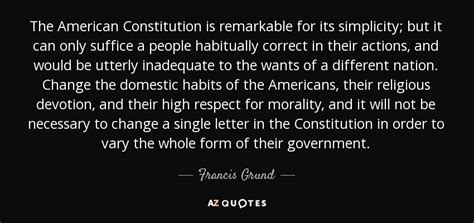A Quote by Epictetus
Freedom and slavery, the one is the name of virtue, and the other of vice, and both are acts of the will.
Related Quotes
A wise man will not leave the right to the mercy of chance, nor wish it to prevail through the power of the majority. There is but little virtue in the action of masses of men. When the majority shall at length vote for the abolition of slavery, it will be because they are indifferent to slavery, or because there is but little slavery left to be abolished by their vote. They will then be the only slaves. Only his vote can hasten the abolition of slavery who asserts his own freedom by his vote.
I consider the domestic virtue of the Americans as the principle source of all their other qualities. It acts as a promoter of industry, as a stimulus to enterprise and as the most powerful restraint of public vice. . . . No government could be established on the same principle as that of the United States with a different code of morals.







































